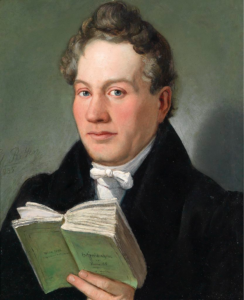Faith, hope and love
(Poet's title: Glaube, Hoffnung und Liebe)
Set by Schubert:
D 955
[August 1828]
Glaube, hoffe, liebe!
Hältst du treu an diesen dreien,
Wirst du nie dich selbst entzweien,
Wird dein Himmel nimmer trübe.
Glaube fest an Gott und Herz!
Glaube schwebet himmelwärts.
Mehr noch als im Sternrevier
Lebt der Gott im Busen dir.
Wenn auch Welt und Menschen lügen,
Kann das Herz doch nimmer trügen.
Hoffe dir Unsterblichkeit
Und hienieden bessre Zeit!
Hoffnung ist ein schönes Licht
Und erhellt den Weg der Pflicht.
Hoffe, aber fordre nimmer!
Tag wird mählig, was erst Schimmer.
Edel liebe, fest und rein!
Ohne Liebe bist du Stein.
Liebe läutre dein Gefühl,
Liebe leite dich ans Ziel!
Soll das Leben glücklich blühen,
Muss der Liebe Sonne glühen.
Willst du nie dich selbst entzweien,
Halte treu an diesen dreien!
Dass nichts deinen Himmel trübe,
Glaube, hoffe, liebe!
Believe, hope, love!
If you hold true to these three,
You will never turn against yourself,
Your skies will never be cloudy.
Believe firmly in God and the heart!
Faith soars towards the heavens.
Even more than in the domain of the stars
God lives within your breast.
Even if the world and humans lie,
Your heart can never be deceived.
Hope for immortality,
And for better times here below!
Hope is a beautiful light,
And it enlightens the path of duty.
Hope, but never make demands.
What begins as a faint glow gradually turns to daylight.
Love nobly, firmly and purely!
Without love you are stone.
May love purify your feelings,
May love lead you to the goal!
If life is going to blossom into happiness
The sun of love needs to shine.
If you never want to turn against yourself,
Hold true to these three!
So that your skies will never be cloudy:
Believe, hope, love!
All translations into English that appear on this website, unless otherwise stated, are by Malcolm Wren. You are free to use them on condition that you acknowledge Malcolm Wren as the translator and schubertsong.uk as the source. Unless otherwise stated, the comments and essays that appear after the texts and translations are by Malcolm Wren and are © Copyright.
☙
Themes and images in this text:
Kuffner’s text about the three virtues at the centre of St. Paul’s famous passage (I Corinthians 13) was first published in 1815, but was reprinted in 1827 in an anthology by and about blind people edited by Johann Wilhelm Klein: Lieder für Blinde und von Blinden. Gesammelt und herausgegeben von Johann Wilhelm Klein, Direktor des k. k. Blinden-Instituts in Wien (pages 50-51).
13 Though I speak with the tongues of men and of angels, and have not charity, I am become as sounding brass, or a tinkling cymbal. 2 And though I have the gift of prophecy, and understand all mysteries, and all knowledge; and though I have all faith, so that I could remove mountains, and have not charity, I am nothing. 3 And though I bestow all my goods to feed the poor, and though I give my body to be burned, and have not charity, it profiteth me nothing. 4 Charity suffereth long, and is kind; charity envieth not; charity vaunteth not itself, is not puffed up, 5 Doth not behave itself unseemly, seeketh not her own, is not easily provoked, thinketh no evil; 6 Rejoiceth not in iniquity, but rejoiceth in the truth; 7 Beareth all things, believeth all things, hopeth all things, endureth all things. 8 Charity never faileth: but whether there be prophecies, they shall fail; whether there be tongues, they shall cease; whether there be knowledge, it shall vanish away. 9 For we know in part, and we prophesy in part. 10 But when that which is perfect is come, then that which is in part shall be done away. 11 When I was a child, I spake as a child, I understood as a child, I thought as a child: but when I became a man, I put away childish things. 12 For now we see through a glass, darkly; but then face to face: now I know in part; but then shall I know even as also I am known. 13 And now abideth faith, hope, charity, these three; but the greatest of these is charity. 1 Corinthians 13, King James Version (KJV)
Kuffner’s poem differs from Paul’s Epistle mainly in turning the abstract nouns (Faith, Hope, Love) into verbs in the imperative mood (Believe! Hope! Love!). The effect is to make the sermon more down to earth and practical. It is about what we should do rather than what we should think.
☙
Original Spelling
Glaube, Hoffnung und Liebe
Glaube, hoffe, liebe!
Hältst du treu an diesen Dreyen,
Wirst du dich nie selbst entzweyen,
Wird dein Himmel nimmer trübe.
Glaube fest an Gott und Herz!
Glaube schwebet himmelwärts.
Mehr noch, als im Sternrevier
Lebt der Gott im Busen dir.
Wenn auch Welt und Menschen lügen,
Kann das Herz doch nimmer trügen.
Hoffe dir Unsterblichkeit,
Und hienieden bess're Zeit!
Hoffnung ist ein schönes Licht,
Und erhellt den Weg der Pflicht.
Hoffe, aber fordre nimmer!
Tag wird mählig, was erst Schimmer.
Edel liebe, fest und rein!
Ohne Liebe bist du Stein.
Liebe läutre dein Gefühl,
Liebe leite dich an's Ziel!
Soll das Leben glücklich blühen,
Muß der Liebe Sonne glühen.
Willst du dich nie selbst entzweyen,
Halte treu an diesen Dreyen!
Daß nichts deinen Himmel trübe:
Glaube, hoffe, liebe!
Confirmed by Peter Rastl with Schubert’s source, Gedichte von Christ. Kuffner, Pesth, Bei Konrad Adolph Hartleben, 1817, pages 87-88, and with Selam. Ein Almanach für Freunde des Mannigfaltigen, Herausgegeben von I.F.Castelli, Vierter Jahrgang 1815, Wien, gedruckt und im Verlage bey Anton Strauß, pages 269-270, here with the title Glaub’, Hoffnung und Liebe.
To see an early edition of the text, go to page 87 [99 von 416] here: http://digital.onb.ac.at/OnbViewer/viewer.faces?doc=ABO_%2BZ169701409


